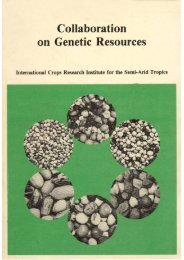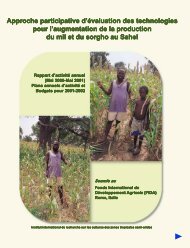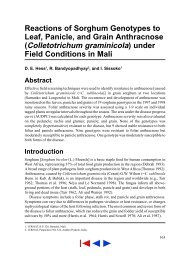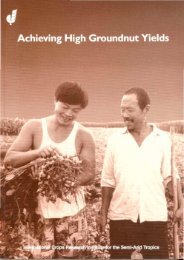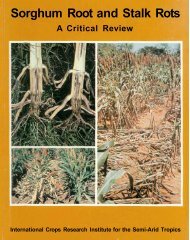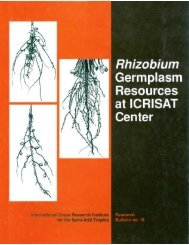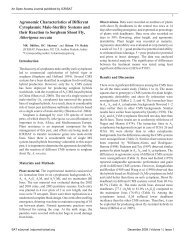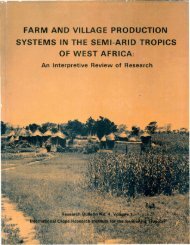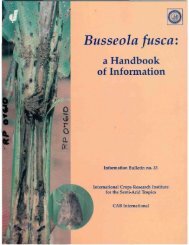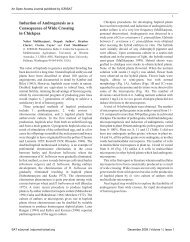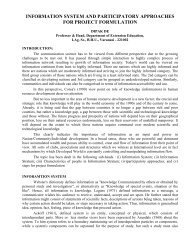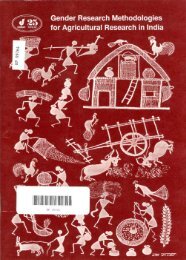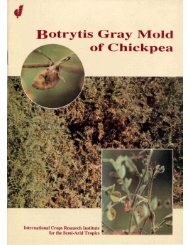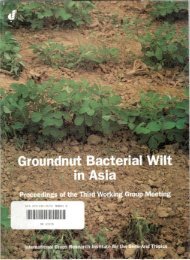RA 00048.pdf - OAR@ICRISAT
RA 00048.pdf - OAR@ICRISAT
RA 00048.pdf - OAR@ICRISAT
Create successful ePaper yourself
Turn your PDF publications into a flip-book with our unique Google optimized e-Paper software.
find that their linkage w i t h t h e rest of t h e s y s t e m<br />
is probably t h e w e a k e s t of all. Despite certain<br />
outstanding exceptions, m a n y s o r g h u m farmers<br />
are virtually u n a w a r e of t h e e x i s t e n c e of research<br />
a n d extension services, let alone actively receiving<br />
those services. This is particularly u n f o r t u n a t e<br />
in that s o r g h u m farmers have d e v e l o p e d , over t h e<br />
centuries, a substantial backlog of folk k n o w l e d g e<br />
relating to t h e crop. W h i l e u n d o u b t e d l y s o m e of<br />
that folk k n o w l e d g e is erroneous, t h e record<br />
s h o w s that practices w h i c h e v o l v e d in folk syst<br />
e m s are m o r e o f t e n than not w e l l suited t o their<br />
respective e n v i r o n m e n t s . As a g r o n o m i s t Pierre<br />
Spitz has n o t e d :<br />
Thus, it is necessary that scientists not be<br />
convinced of t h e superiority that their k n o w <br />
ledge of t h e agricultural sciences c o n f e r s u p o n<br />
t h e m , but c o n v i n c e d of t h e richness of peasant<br />
k n o w - h o w . Science begins in this d o m a i n as in<br />
m o s t others w i t h m o d e s t y a n d t h e capacity t o<br />
admit o n e ' s ignorance, not w i t h arrogance a n d<br />
c o n t e m p t (1979, p. 278, our translation).<br />
Processes of R e s e a r c h<br />
D e c i s i o n - m a k i n g<br />
A n understanding o f t h e structure o f t h e s o r g h u m<br />
research s y s t e m m u s t also include an examination<br />
of the p r o c e s s e s by w h i c h that research<br />
s y s t e m functions. W h i l e it is necessary to v i e w<br />
t h e s o r g h u m research s y s t e m as a broad social<br />
s y s t e m e m b e d d e d in, influenced by, a n d influencing<br />
political, social a n d e c o n o m i c institutions, t h e<br />
research s y s t e m is also a social n e t w o r k consisting<br />
of individuals a n d groups of individuals w h o<br />
have needs, desires, goals, personality traits, and<br />
various experiences a n d w h o a t t e m p t t o influence<br />
o n e another in a variety of w a y s . W h i l e scientists<br />
are o f t e n s e e m i n g l y free t o s t u d y w h a t t h e y w i s h ,<br />
their interests m a y be strongly influenced by<br />
social psychological factors as w e l l as structural<br />
factors s u c h as political and e c o n o m i c f o r c e s .<br />
W h a t scientists study, t h e m e t h o d s a n d theories<br />
t h e y use i n their studies, a n d h o w t h e y c h o o s e t o<br />
present their results are all decisions w h i c h m a y<br />
be influenced by nonscientific variables.<br />
The d e m o g r a p h i c b a c k g r o u n d of researchers<br />
a n d research administrators m a y influence, or be<br />
related t o , t h e n a t u r e of agricultural research on<br />
s o r g h u m . For e x a m p l e , Z u c k e r m a n (1977) in her<br />
s t u d y of N o b e l Prize w i n n i n g scientists f o u n d that<br />
t h e y t e n d e d to have a n u m b e r of d e m o g r a p h i c<br />
similarities such as having s t u d i e d at o n e of only a<br />
handful of universities and being c o m p a r a b l e in<br />
age. W h o are t h e s o r g h u m scientists, research<br />
administrators and policy makers? W h a t is t h e<br />
nature of their background and education? H o w<br />
h o m o g e n e o u s or h e t e r o g e n e o u s are their backg<br />
r o u n d s and experiences? Is t h e r e a potential<br />
insularity in their educational and research experie<br />
n c e s ?<br />
T h e s e e d u c a t i o n a l e x p e r i e n c e s a n d backg<br />
r o u n d s are important c o m p o n e n t s of t h e larger<br />
process that is k n o w n as career socialization. The<br />
career of an agricultural scientist entails n u m e r o u s<br />
experiences a n d decisions w h i c h are continuously<br />
b e i n g r e e x a m i n e d and r e f o r m u l a t e d . I m p o r t a n t<br />
choices entail t h e field, discipline, or crop specialization<br />
itself, t h e specific research p r o b l e m s or<br />
questions, t h e choice of research m e t h o d s and<br />
approaches, t h e identification of key c o n c e p t s a n d<br />
t h e theoretical orientation. The processes by<br />
w h i c h t h e s e essential decisions are m a d e are<br />
i m p o r t a n t for understanding t h e current products<br />
as w e l l as t h e f u t u r e possibilities of t h e research<br />
s y s t e m . A n u m b e r of people in a scientist's career<br />
m a y i m p i n g e o n t h o s e decisions. T h e s e potential<br />
socializing agents m a y include o n e ' s i m m e d i a t e<br />
supervisor, a colleague in t h e scientist's departm<br />
e n t or research institute, a colleague in another<br />
agricultural science d e p a r t m e n t or another research<br />
institute, a research assistant or technician,<br />
a graduate or postdoctoral student, a f o r m e r<br />
professor, a director of o n e ' s research facility, a<br />
client or potential user, or a research r e v i e w<br />
c o m m i t t e e . H o w d o t h e s e various sources o f<br />
influence affect t h e various d i m e n s i o n s of research<br />
for s o r g h u m scientists? At w h a t point in<br />
their careers are particular sources influential a n d<br />
w h o are t h e m o s t important persons i n shaping<br />
t h e s e research decisions?<br />
Equally i m p o r t a n t is an understanding of t h e<br />
nature of each scientist's research on s o r g h u m .<br />
To w h a t e x t e n t can it be characterized as basic,<br />
applied or d e v e l o p m e n t ? Do scientists divide their<br />
t i m e b e t w e e n research, administration, e x t e n <br />
sion, and teaching? H o w d o e s this affect t h e<br />
quantity and quality of their w o r k ?<br />
A n o t h e r important d i m e n s i o n in t h e process of<br />
research on s o r g h u m is t h e role of b o t h f o r m a l<br />
a n d informal c o m m u n i c a t i o n . Carol Ganz (1976, p.<br />
387} recently e x a m i n e d t h e role of scientific<br />
c o m m u n i c a t i o n in t h e process of technological<br />
innovation and c o n c l u d e d that " t h r o u g h i m p r o v e d<br />
understanding o f t h e i n f o r m a t i o n f l o w and m a n -<br />
6 9 4



